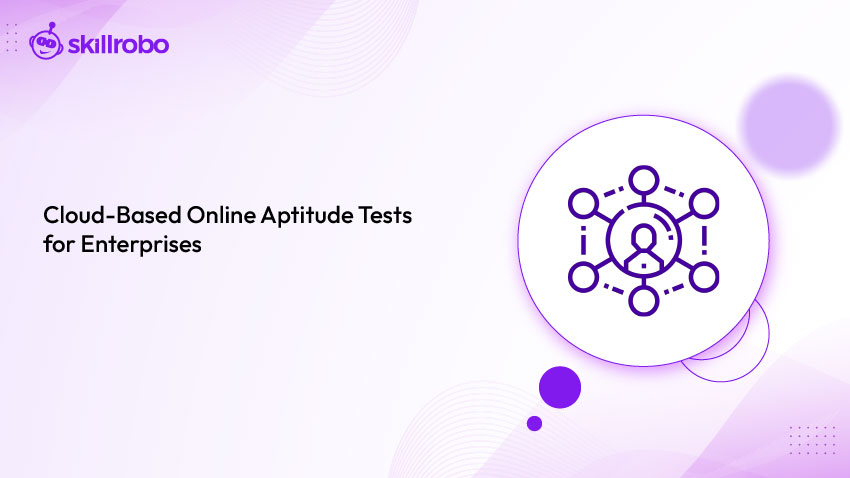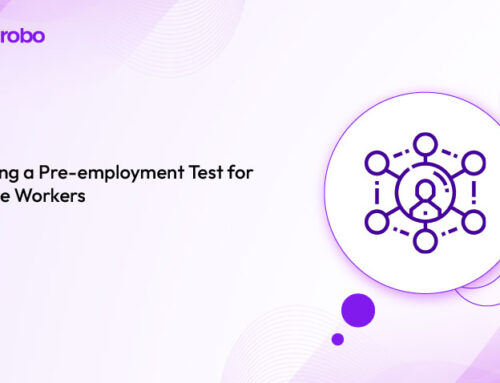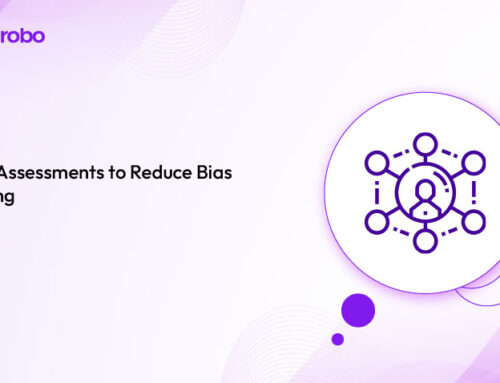
Key Takeaways
- Cloud-based aptitude tests streamline enterprise hiring by assessing skills and fit with scalable, secure platforms.
- AI-driven assessments ensure role-specific evaluations, enhancing accuracy and fairness in large-scale recruitment.
- Real-time analytics provide instant insights, enabling data-driven decisions for enterprise talent acquisition.
- Proctoring tools maintain test integrity, ensuring reliable results across distributed enterprise workforces.
Transforming Enterprise Hiring with Cloud-Based Testing
Enterprises face unique hiring challenges, needing to evaluate large volumes of candidates while ensuring skills align with complex roles. Cloud-based online aptitude tests offer a solution, providing scalable, secure platforms to assess cognitive, technical, and behavioral competencies. These tools enable HR professionals to streamline recruitment, reduce bias, and make informed decisions, even across global teams. By leveraging cloud technology, enterprises access real-time data and flexible testing, revolutionizing talent acquisition.
In this blog, we’ll explore why these tests work, their benefits, and practical tips for implementation, showing how Skillrobo empowers enterprises to optimize hiring efficiently.
Cloud-Based Aptitude Testing: Why, Benefits, and Tips
Cloud-based aptitude testing transforms enterprise hiring, offering scalable, tech-driven solutions for assessing skills globally. It tackles recruitment challenges with precision and efficiency. This blog explores why it works, its key benefits, and actionable tips, highlighting how tools like Skillrobo optimize talent acquisition for modern enterprises effectively.
Why It Works –
Cloud-based testing excels by aligning assessments with enterprise needs, leveraging technology for precision and fairness. Its flexibility supports global hiring, while AI enhances accuracy across roles. This section explains why these tools are effective, ensuring enterprises hire talent that meets complex demands seamlessly.
1. Aligning with Complex Roles
Generic assessments often fail to capture the intricacies of enterprise roles like logistics optimization or strategic planning. Cloud-based tests allow for role-specific design, ensuring candidates demonstrate relevant skills—say, supply chain efficiency for a logistics manager. This alignment reduces hiring missteps, guaranteeing talent meets precise job demands. For instance, a healthcare firm might test patient data analysis, ensuring hires excel in critical, specialized tasks from day one.
2. Supporting Global Reach
Enterprises operate across borders, requiring consistent evaluations regardless of location. Cloud-based tests enable candidates—whether remote developers in Asia or field sales in Europe—to participate with just an internet connection. This uniformity simplifies hiring for distributed teams, eliminating logistical barriers. A multinational retailer, for example, can assess store managers worldwide simultaneously, ensuring talent quality isn’t compromised by geography.
3. Leveraging AI Precision
AI transforms cloud testing by crafting questions tailored to enterprise needs, like coding challenges for developers or scenario analysis for executives. Assessments for technical expertise on Skillrobo ensure precision, mirroring real-world tasks. A tech firm might use AI to test algorithm design, delivering results that predict on-the-job success accurately, far beyond what generic tests can achieve.
4. Ensuring Fair Evaluations
Bias—like favoring prestigious degrees—can skew hiring. AI in cloud testing focuses on performance metrics, not demographics, ensuring impartiality. Leadership roles might assess decision-making through simulations, leveling the field. A Deloitte study notes AI cuts biased decisions by 35%, helping enterprises build diverse, innovative teams vital for global competitiveness and varied workforce dynamics.
5. Adapting to Candidate Levels
Enterprise roles span entry-level to executive, and adaptive testing adjusts question difficulty accordingly. For a finance position, a junior candidate might face basic accounting, while a senior tackles complex forecasting. This flexibility ensures accurate assessments across hierarchies, avoiding overwhelm or boredom. A manufacturing firm could thus evaluate technicians and managers effectively in one platform.
How Does It Benefit Enterprises?
Cloud-based testing offers enterprises scalability, efficiency, and security, transforming recruitment into a strategic advantage. From cost savings to seamless integration, these benefits streamline hiring across large, distributed teams. This section highlights how enterprises gain from adopting these innovative platforms effectively.
1. Handling High-Volume Hiring
Enterprises often face massive applicant pools, like during retail holiday rushes or tech expansion. Cloud platforms scale effortlessly, managing thousands of tests concurrently without quality dips. A tech giant hiring 5,000 engineers can maintain rigorous evaluations, meeting demand fast. This scalability ensures recruitment aligns with business growth, avoiding bottlenecks in critical hiring periods.
2. Integrating HR Workflows
Fragmented HR processes waste time. Cloud tools integrate with applicant tracking systems, centralizing data from assessments to onboarding. A healthcare enterprise might track nurse candidates’ test scores, interview notes, and compliance checks in one hub, cutting errors. This seamless workflow boosts efficiency, letting recruiters focus on strategy rather than manual data juggling.
3. Securing Candidate Data
In regulated sectors like finance, data breaches risk penalties. Cloud platforms use encryption and compliance protocols—like GDPR or HIPAA—to safeguard candidate info. A bank testing analysts globally can trust its data stays secure, meeting legal standards. This protection builds credibility, ensuring enterprises handle sensitive recruitment processes with confidence across locations.
4. Cutting Recruitment Costs
Traditional testing demands venues, proctors, and travel—costs that balloon for enterprises. Cloud solutions eliminate these, requiring only internet access. A retailer assessing 10,000 seasonal workers saves on logistics, redirecting funds to training. Over time, this cost efficiency scales, offering high-quality evaluations without the financial strain of physical infrastructure.
5. Providing Instant Insights
Slow hiring loses talent. Real-time analytics deliver instant scores, rankings, and skill breakdowns, speeding decisions. For sales roles, recruiters might see top negotiation performers in minutes, not days. A logistics firm could shortlist coordinators quickly, aligning hires with urgent needs. This data-driven speed keeps enterprises competitive in talent acquisition.
Tips for Implementing Cloud-Based Aptitude Testing
Implementing cloud-based testing requires thoughtful planning to maximize its potential for enterprises. From customization to accessibility, these tips ensure seamless adoption and effective results. This section provides actionable advice to optimize hiring with cloud platforms like Skillrobo efficiently.
1. Customize for Job Functions
One-size-fits-all tests don’t suit enterprises. Tailor assessments to specific skills—like analytics for marketers or multitasking for admins—using platforms like Skillrobo’s tools for evaluating candidate skills. A telecom firm might test network troubleshooting, ensuring hires are job-ready. Customization aligns evaluations with enterprise roles, boosting hiring accuracy significantly.
2. Use Real-World Scenarios
Abstract tests miss practical ability. Incorporate scenarios—like conflict resolution for managers or coding bugs for developers—to mirror workplace challenges. A logistics company might simulate delivery delays and testing problem-solving. This ensures hires can handle real issues, from client negotiations to project hiccups, making assessments predictive of on-the-job success.
3. Offer Diverse Question Banks
Enterprises need varied skills—creativity for designers, and logic for engineers. Cloud platforms with flexible question banks let recruiters test multiple competencies in one go. A media firm might assess graphic design and deadline management together, ensuring hires fit complex roles. This comprehensive approach strengthens talent selection across departments.
4. Simplify Test Creation
Manual test design slows recruitment. Cloud tools offer pre-built, customizable templates—like for customer support positions—streamlining setup. A retailer could tweak a service test for regional needs in hours, not weeks. This speed ensures enterprises deploy assessments fast, keeping hiring aligned with job demands without delays.
5. Automate Score Analysis
Manual scoring bogs down large-scale hiring. AI instantly analyzes thousands of tests, ranking candidates by skills—like negotiation for sales. A call center hiring 500 reps can focus on top performers quickly, saving time. This automation enhances efficiency, letting recruiters prioritize engagement over data crunching in busy cycles.
6. Personalize Feedback
Generic results disengage candidates. AI delivers tailored reports, showing strengths—like problem-solving for analysts—or gaps, fostering trust. A candidate for a tech role might see coding strengths highlighted, encouraging reapplication if unsuccessful. This transparency keeps talent motivated, strengthening enterprise appeal in competitive hiring markets effectively.
7. Scale for Global Teams
Global hiring demands consistency. AI adapts questions for cultural nuances—like leadership styles across regions—ensuring uniform evaluations. A multinational might test engineers in Asia and Europe identically, meeting diverse needs. This scalability ensures enterprises assess worldwide talent with precision, supporting cohesive team-building across borders.
8. Secure with AI Proctoring
Cheating undermines results, especially for analytical roles. AI proctoring flags screen-sharing or anomalies, ensuring honesty. Evaluations of analytical skills confirm the true ability of data analysts, giving enterprises confidence. This reliability protects high-stakes hiring, ensuring hires meet rigorous standards across distributed workforces.
9. Balance Privacy in Proctoring
Invasive proctoring—like constant webcam use—deters candidates. Non-intrusive browser monitoring secures tests discreetly, building trust. For sensitive finance roles, this balance encourages participation without discomfort. Enterprises maintain security while fostering positive experiences, critical for attracting top talent in competitive, distributed hiring environments consistently.
10. Adjust for Home Settings
Remote candidates face distractions—noise, and interruptions. Flexible proctoring ignores minor issues, focusing on skills, not environment. A parent testing for an admin role isn’t penalized for a crying child, ensuring fairness. Enterprises assess talent equitably, avoiding bias from home conditions across varied locations effectively.
11. Enable Flexible Testing
Time zones challenge global hiring. Asynchronous tools let candidates test on their schedules, secured post-completion. A retailer hiring support across continents ensures all participate without rigid slots. This flexibility broadens talent access, maintaining integrity while fitting enterprise needs for international recruitment seamlessly.
12. Clarify Proctoring Rules
Vague rules confuse applicants. Clear instructions—like allowing calculators for finance tests—set expectations, reducing stress. A logistics candidate knowing headphones are permitted focuses better, boosting performance. Enterprises ensure fairness and confidence, smoothing high-stakes cloud assessments for diverse pools with clarity.
13. Ensure Tech Accessibility
Poor internet excludes talent, especially globally. Low-bandwidth options ensure smooth testing, critical for enterprises. A rural marketer isn’t sidelined by connectivity, showcasing skills instead. This inclusivity strengthens recruitment, letting diverse candidates compete fairly for varied roles across distributed teams consistently.
14. Reduce Test Anxiety
Unfamiliar platforms rattle applicants, skewing results. Practice questions and guides—like sample leadership scenarios—build confidence. A manager candidate performs optimally, not nervously, ensuring true potential shines. Enterprises benefit from accurate assessments, avoiding stress-induced errors in evaluating talent for critical roles effectively.
15. Streamline Admin Tasks
Large-scale testing overwhelms HR. Cloud platforms automate scheduling and scoring, centralizing data. A retailer hiring 1,000 seasonal workers tracks progress in one hub, freeing recruiters for engagement. This efficiency ensures enterprises manage complex needs across roles without administrative bottlenecks effectively.
Conclusion
Cloud-based aptitude tests empower enterprises to hire with precision, aligning skills with complex roles across global teams. Skillrobo enhances this with role-specific assessments, AI-driven questions, proctoring, and real-time analytics, ensuring fair, scalable recruitment. By adopting these tools, enterprises overcome hiring challenges and build high-performing teams. Sign up at Skillrobo to transform your talent acquisition with cutting-edge cloud solutions today.









